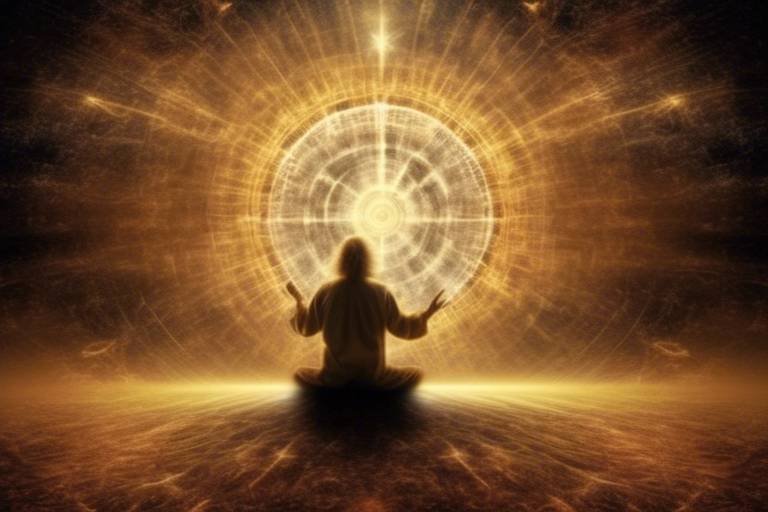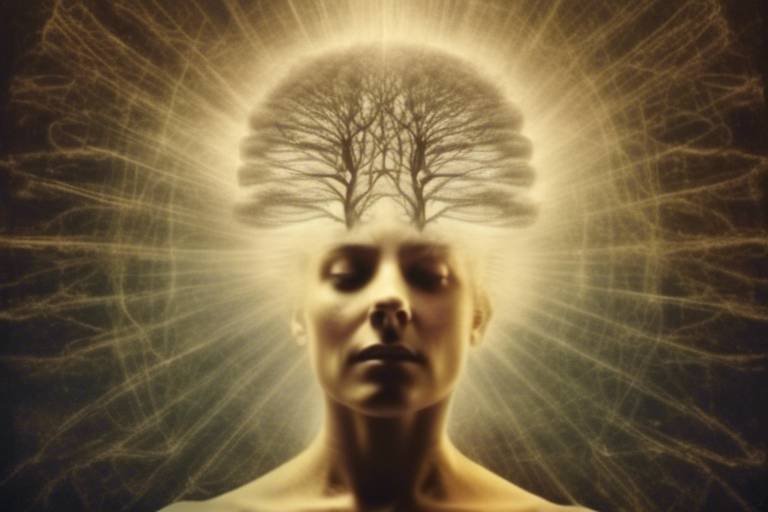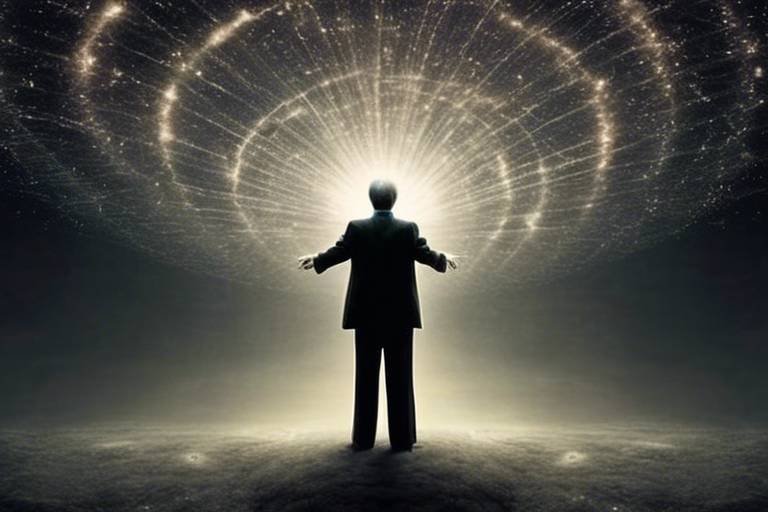How Does Metaphysics Address Spiritual Phenomena?
When we delve into the realms of metaphysics and spirituality, we embark on a journey that transcends the ordinary. Imagine standing at the edge of a vast ocean, where the waves of reality crash against the shore of our understanding. Metaphysics serves as the map guiding us through these turbulent waters, offering insights into the spiritual phenomena that often leave us in awe. But what exactly is metaphysics, and how does it relate to the spiritual experiences that many of us encounter?
At its core, metaphysics is a branch of philosophy that seeks to answer the most profound questions about existence, reality, and the universe. It invites us to ponder the nature of being and the essence of things that go beyond mere physical observation. By exploring concepts such as time, space, and causality, metaphysics opens the door to understanding spiritual phenomena—those extraordinary experiences that seem to defy the laws of the physical world.
Consider the experience of enlightenment, often described as a moment of profound clarity and understanding. Metaphysics provides a framework for interpreting such experiences, suggesting that they might be glimpses into a deeper reality that exists beyond our typical sensory perceptions. Through the lens of metaphysics, we can begin to understand that these moments are not random occurrences but rather integral parts of our spiritual journey.
Furthermore, metaphysical concepts can help us make sense of mystical experiences, where individuals report feelings of unity with the universe, transcending the self. These experiences challenge our conventional understanding of individuality and reality, pushing us to reconsider what it means to exist. By examining these phenomena through a metaphysical perspective, we can appreciate the intricate connections between our consciousness and the universe, revealing that our spiritual experiences may be more than mere coincidences.
As we explore the intersection of metaphysics and spirituality, we must also acknowledge the historical perspectives that have shaped our understanding. Different cultures have interpreted spiritual phenomena in unique ways, influenced by their metaphysical beliefs. For instance, Eastern philosophies like Buddhism and Hinduism offer rich metaphysical frameworks that emphasize the interconnectedness of all beings, providing valuable insights into spiritual experiences. On the other hand, Western metaphysical thought, influenced by philosophers like Plato and Descartes, offers distinct views that contribute to our understanding of spirituality in a modern context.
In summary, metaphysics addresses spiritual phenomena by providing a comprehensive framework that allows us to explore the deeper aspects of existence. It encourages us to question our understanding of reality and consciousness, ultimately enriching our spiritual practices. Whether through meditation, prayer, or personal reflection, the insights gained from metaphysical thought can enhance our spiritual journeys, guiding us toward a greater understanding of ourselves and the universe.
- What is metaphysics? Metaphysics is a branch of philosophy that studies the fundamental nature of reality, existence, and the universe.
- How does metaphysics relate to spirituality? Metaphysics provides a framework for understanding spiritual phenomena, offering insights into experiences that transcend the physical realm.
- Can metaphysical concepts enhance spiritual practices? Yes, insights from metaphysical thought can inform and enrich various spiritual practices, such as meditation and prayer.
- What are some examples of spiritual phenomena? Examples include intuition, enlightenment, mystical experiences, and feelings of unity with the universe.

Understanding Metaphysics
Metaphysics is a fascinating branch of philosophy that dives deep into the fundamental nature of reality, existence, and the universe itself. Imagine standing at the edge of a vast ocean, gazing out at the horizon, pondering what lies beyond the visible waves. This is akin to what metaphysics seeks to explore—questions that go beyond the tangible and seek to understand the essence of being. At its core, metaphysics addresses some of the most profound questions we can ask: What is the nature of reality? What does it mean to exist? And how do we understand the universe in which we live?
To grasp metaphysics, we must first explore its core principles, which can be broadly categorized into several key areas:
- Ontology: This is the study of being and existence. It asks questions like, “What entities exist?” and “What is their nature?”
- Cosmology: This branch examines the origins and structure of the universe. It delves into topics such as time, space, and causality.
- Epistemology: Although often considered a separate branch, epistemology overlaps with metaphysics as it investigates the nature of knowledge and belief. It explores how we know what we know about the world.
These principles serve as the foundation for understanding not just the physical world, but also the spiritual dimensions that many people experience. For instance, when discussing spirituality, metaphysics provides a framework that helps individuals interpret their experiences, such as feelings of intuition or moments of enlightenment. It invites us to consider that there may be more to reality than what we can see and touch, suggesting that spiritual phenomena could be manifestations of deeper metaphysical truths.
Moreover, the interplay between metaphysics and spirituality is particularly intriguing. As we delve into metaphysical concepts, we begin to uncover insights that can illuminate our spiritual journeys. For example, the idea of dualism—the notion that there are two fundamental kinds of substance that make up reality, typically the physical and the non-physical—offers a lens through which to view spiritual experiences. This perspective suggests that our spiritual selves exist alongside our physical bodies, engaging with a reality that transcends mere material existence.
In summary, understanding metaphysics is like opening a door to a room filled with questions about existence, reality, and the universe. It compels us to explore beyond the surface and consider the deeper meanings that lie beneath our everyday experiences. By engaging with these philosophical inquiries, we can enrich our understanding of spirituality and the myriad ways it manifests in our lives.

The Nature of Spiritual Phenomena
Spiritual phenomena are those intriguing experiences that seem to transcend our everyday reality, inviting us to explore realms beyond the physical. Imagine standing at the edge of a vast ocean, where the waves represent our tangible experiences, and the deep blue abyss signifies the spiritual realm. This section delves into various forms of spiritual phenomena, such as intuition, enlightenment, and mystical experiences, each offering unique insights into the human experience.
At its core, spiritual phenomena encompass any experience that evokes a sense of connection to something greater than oneself. These experiences can be deeply personal and often defy logical explanation. For instance, consider the moment when you just "know" something without any rational basis—this is intuition at play. It's as if your inner compass is guiding you, tapping into a reservoir of knowledge that lies beyond the confines of the physical world.
Enlightenment, on the other hand, is often described as a profound realization or awakening. It's that "aha!" moment when everything clicks into place, and you feel a surge of understanding that transcends ordinary thought. Mystical experiences can range from feelings of unity with the universe to visions that transport one to alternate dimensions. These moments can leave individuals feeling transformed, as if they've glimpsed the very essence of existence.
To further illustrate the nature of spiritual phenomena, let's take a closer look at some common types:
- Intuition: A gut feeling or instinct that guides decisions and actions.
- Enlightenment: A state of profound understanding or insight, often linked to spiritual awakening.
- Mystical Experiences: Intense moments of connection with the divine or the universe, often characterized by feelings of peace and unity.
These phenomena are not merely abstract concepts; they have significant implications for our lives. They challenge us to consider the nature of reality and our place within it. Spiritual experiences can lead to a deeper understanding of ourselves and our relationships with others, fostering a sense of community and interconnectedness.
In exploring spiritual phenomena, we also encounter questions that have puzzled humanity for ages: What is the nature of consciousness? How do these experiences shape our understanding of existence? By examining these questions through a metaphysical lens, we can uncover layers of meaning that enrich our spiritual journeys.
In conclusion, the nature of spiritual phenomena invites us to embark on a journey of discovery, where we can explore the depths of our consciousness and the mysteries of the universe. These experiences remind us that there is so much more to life than what meets the eye, urging us to look beyond the surface and seek the profound connections that bind us all.
- What are spiritual phenomena? Spiritual phenomena refer to experiences that transcend the physical world, such as intuition, enlightenment, and mystical experiences.
- How do metaphysics and spirituality relate? Metaphysics provides a framework for understanding the fundamental nature of reality, which can inform our understanding of spiritual experiences.
- Can spiritual phenomena be scientifically studied? While many spiritual experiences are subjective, researchers are increasingly exploring the psychological and neurological aspects of these phenomena.

Historical Perspectives on Spirituality
Throughout the ages, humanity has sought to understand the mysteries of existence, and spirituality has played a pivotal role in this quest. The historical perspectives on spirituality are as diverse as the cultures that have explored them. From ancient civilizations to modern times, the interpretations of spiritual phenomena have evolved, shaped by metaphysical thought and cultural contexts. It's fascinating to see how these interpretations have informed and influenced one another across different epochs and geographic locations.
In ancient times, spirituality was often intertwined with daily life and the natural world. Civilizations such as the Egyptians and Greeks viewed the divine as an integral part of their existence. For instance, the Egyptians believed in a pantheon of gods who governed various aspects of life and death. Their metaphysical concepts revolved around the afterlife and the soul's journey, which were deeply rooted in their spiritual practices. Similarly, the Greeks, particularly philosophers like Plato, introduced ideas about the soul's immortality and the existence of a higher reality beyond the physical world.
As we moved into the Middle Ages, spirituality became heavily influenced by religious doctrines. The Christian worldview dominated, with metaphysical questions about God, creation, and the nature of good and evil taking center stage. Thinkers like Augustine and Aquinas contributed significantly to this discourse, merging classical philosophy with theological insights. Their works provided a framework for understanding spirituality that was deeply rooted in faith and divine revelation.
In contrast, the Renaissance sparked a revival of interest in humanism and the natural world, leading to a more personal exploration of spirituality. This period saw a shift from a solely religious interpretation of spiritual phenomena to a more individualistic approach. People began to seek their own spiritual experiences, often turning to mystical traditions within Christianity, such as the writings of mystics like Julian of Norwich and Meister Eckhart, who emphasized direct personal encounters with the divine.
The Enlightenment further transformed the landscape of spirituality. Rationalism and empiricism challenged traditional beliefs, prompting thinkers to explore spirituality from a more philosophical and scientific perspective. Figures like Descartes and Kant questioned the nature of reality and consciousness, laying the groundwork for modern metaphysical discussions. This era marked a significant departure from dogmatic spirituality, encouraging individuals to seek knowledge and truth through reason.
As we entered the 19th and 20th centuries, the emergence of various spiritual movements reflected the growing desire for alternative spiritual experiences. Theosophy, Spiritualism, and Eastern philosophies like Buddhism and Hinduism began to gain traction in the West. These movements introduced new metaphysical frameworks that emphasized personal enlightenment, interconnectedness, and the exploration of consciousness. For instance, the concept of karma and reincarnation from Eastern thought provided a fresh lens through which to understand spiritual phenomena, challenging conventional Western notions of linear existence.
Today, the landscape of spirituality is incredibly rich and varied. With the rise of New Age thinking and holistic practices, individuals are encouraged to explore spirituality beyond traditional religious boundaries. This contemporary approach often integrates insights from various metaphysical traditions, fostering a more inclusive understanding of spiritual phenomena. As we reflect on these historical perspectives, it becomes clear that the journey of spirituality is a tapestry woven from countless threads of thought, belief, and experience.
In summary, the historical perspectives on spirituality reveal a dynamic interplay between metaphysical concepts and cultural interpretations. From the ancient Egyptians to modern New Age practices, each era has contributed to a broader understanding of what it means to be spiritual. This ongoing evolution invites us to explore our own spiritual journeys, informed by the rich tapestry of human thought and experience.
- What is the significance of spirituality in human history? Spirituality has been a fundamental aspect of human existence, influencing cultures, philosophies, and individual lives throughout history.
- How have metaphysical ideas shaped spiritual practices? Metaphysical ideas provide frameworks for understanding spiritual experiences, guiding practices like meditation and prayer across various traditions.
- What role does consciousness play in spirituality? Consciousness is central to both metaphysical inquiry and spiritual experience, leading to profound questions about the nature of reality and existence.

Eastern Philosophical Views
When we dive into the rich tapestry of Eastern philosophies, we encounter a profound understanding of spiritual phenomena that transcends the mundane. Traditions such as Buddhism and Hinduism have developed intricate metaphysical frameworks that provide deep insights into the nature of reality and existence. These philosophies do not merely scratch the surface; they delve into the essence of being, consciousness, and the universe itself. For instance, in Buddhism, the concept of anatta (non-self) challenges the very notion of a permanent, unchanging self, suggesting that our spiritual experiences are fluid and interconnected with the cosmos.
Hinduism, on the other hand, introduces us to the idea of Brahman, the ultimate reality that pervades everything. This notion posits that individual souls (Atman) are not separate entities but rather manifestations of the same universal essence. This perspective encourages a sense of unity and interconnectedness, which can profoundly shape one’s spiritual journey. The interplay between the individual and the universal is not just philosophical; it is a lived experience for many practitioners, who find themselves in moments of deep meditation or prayer that blur the lines between self and the cosmos.
Moreover, both traditions emphasize the importance of meditative practices as a means to transcend ordinary perceptions and connect with deeper spiritual truths. For example, the practice of mindfulness in Buddhism is not just about being present; it is about cultivating a profound awareness that can lead to enlightenment—an awakening to the true nature of reality. Similarly, Hindu practices like yoga and puja (worship) serve as pathways to experience the divine and realize the interconnectedness of all existence.
To illustrate the significance of these concepts, consider the following table that summarizes key metaphysical ideas from Eastern philosophies:
| Philosophy | Key Concept | Significance |
|---|---|---|
| Buddhism | Anatta (Non-Self) | Challenges the notion of a permanent self, promoting interconnectedness. |
| Hinduism | Brahman (Ultimate Reality) | Encourages understanding of the unity of all existence. |
| Buddhism | Mindfulness | A practice that fosters awareness and leads to spiritual awakening. |
| Hinduism | Yoga | A method for experiencing the divine and achieving spiritual growth. |
In conclusion, Eastern philosophies offer a rich and nuanced understanding of spiritual phenomena. By embracing these metaphysical frameworks, individuals can embark on a journey that not only enhances their spiritual practices but also deepens their connection to the universe. Whether through meditation, yoga, or the study of ancient texts, the insights gleaned from these traditions can profoundly transform one’s understanding of existence and the spiritual realm.
- What is the main difference between Eastern and Western philosophies regarding spirituality? Eastern philosophies tend to focus on interconnectedness and the fluid nature of existence, while Western philosophies often emphasize individuality and the separation of self from the universe.
- How can I incorporate Eastern philosophical principles into my spiritual practice? You can start by exploring meditation, mindfulness, and yoga, which are foundational practices in Eastern traditions that promote awareness and connection to the self and the universe.
- Are there any modern interpretations of Eastern philosophies? Yes, many contemporary spiritual movements draw from Eastern principles, adapting them to fit modern lifestyles and beliefs, making them accessible to a broader audience.

Western Philosophical Approaches
When it comes to understanding spirituality through a Western lens, we can't overlook the profound impact of historical figures like Plato and René Descartes. These thinkers laid the groundwork for metaphysical inquiry, intertwining philosophy with the quest for spiritual understanding. Plato, for instance, introduced the concept of the Forms, suggesting that the material world is merely a shadow of a higher reality. This idea encourages a view of spirituality as a pathway to grasping these eternal truths, emphasizing that our physical experiences are just a glimpse of something far greater.
Descartes, on the other hand, famously proclaimed, "I think, therefore I am," which shifted the focus to consciousness as the foundation of existence. His dualistic approach separates the mind from the body, opening up discussions about the nature of the soul and its connection to the divine. This separation raises intriguing questions: Is our consciousness merely a byproduct of physical processes, or does it point to a deeper, spiritual reality? Such inquiries have paved the way for a rich dialogue on the interplay between the material and the spiritual.
Moreover, the influence of Immanuel Kant cannot be overlooked. Kant's work on the limits of human understanding posits that while we can know the phenomena of the world, the noumena—the things-in-themselves—remain beyond our grasp. This notion resonates with spiritual seekers who often feel that their experiences transcend rational explanation. Kant’s philosophy invites us to consider that spiritual experiences might be glimpses of a reality that is fundamentally unknowable yet profoundly impactful.
In contemporary discussions, the integration of metaphysics with modern psychology has opened new avenues for exploring spiritual phenomena. The works of philosophers like Martin Heidegger and Jean-Paul Sartre delve into existence and consciousness, emphasizing the subjective experience of being. Their existentialist approaches challenge us to confront our own realities, encouraging a personal exploration of spirituality that is deeply rooted in individual experience and understanding.
To sum it up, Western philosophical approaches provide a rich tapestry of thought that enhances our understanding of spirituality. By examining the intersections of consciousness, existence, and the divine, we gain insights that can transform our spiritual practices. As we navigate these complex ideas, we find ourselves asking questions that lead to deeper self-discovery and a more profound connection to the world around us.
- What is the main focus of Western philosophy regarding spirituality?
Western philosophy often emphasizes the relationship between consciousness and reality, exploring how our understanding of existence shapes our spiritual experiences. - How does Plato's theory of Forms relate to spirituality?
Plato's theory suggests that the material world is a reflection of a higher, spiritual reality, encouraging seekers to look beyond the physical for deeper truths. - What role does consciousness play in spiritual practices?
Consciousness is seen as a bridge between the material and spiritual realms, influencing how individuals engage with their spiritual journeys.

Metaphysical Frameworks for Spiritual Understanding
When we dive into the realm of metaphysical frameworks, we uncover a treasure trove of insights that can illuminate our spiritual journeys. These frameworks serve as lenses through which we can view and interpret spiritual phenomena, helping us to make sense of experiences that often feel beyond our grasp. At their core, metaphysical frameworks attempt to answer some of the most profound questions about existence, reality, and consciousness. They act as a bridge connecting our physical experiences to the deeper, more elusive aspects of spirituality.
One of the most prominent metaphysical frameworks is dualism, which posits that there are two fundamental kinds of substances: the physical and the non-physical (or spiritual). This perspective suggests that our physical bodies and our consciousness are distinct entities. Imagine a computer and its software; while the hardware is tangible and can be touched, the software operates in a realm that is not physically present. Similarly, dualism allows us to explore the notion that our spiritual experiences—such as intuition or enlightenment—are rooted in a non-physical dimension. This separation can help individuals understand that their spiritual experiences are not merely products of the brain but are connected to a broader reality.
On the other hand, we have idealism, which flips the script by asserting that reality is fundamentally mental. In this view, the physical world is a manifestation of consciousness. Think of it like a dream: everything you experience in a dream feels real, yet it exists solely within your mind. Idealism invites us to consider that our spiritual experiences might be reflections of a deeper mental or spiritual reality. This perspective can empower individuals to tap into their consciousness, as it emphasizes that our thoughts, beliefs, and intentions shape our experiences.
Another interesting framework is panpsychism, which posits that consciousness is a fundamental aspect of all matter. This means that everything in the universe, from the smallest pebble to the largest galaxy, possesses some form of consciousness. Imagine walking through a forest; with this perspective, you might feel a connection not just to the trees but to the very rocks beneath your feet. This viewpoint can enrich spiritual practices by fostering a sense of interconnectedness with all of existence, encouraging individuals to see the divine in every aspect of the world around them.
To better understand how these frameworks influence spiritual understanding, consider the following table that summarizes key concepts:
| Framework | Core Idea | Spiritual Implication |
|---|---|---|
| Dualism | Two distinct substances: physical and non-physical | Spiritual experiences are separate from physical existence |
| Idealism | Reality is fundamentally mental | Spiritual experiences shape our reality |
| Panpsychism | Consciousness is present in all matter | Interconnectedness with all beings enhances spiritual practices |
These metaphysical frameworks not only provide a structure for understanding spiritual phenomena but also invite us to explore our own beliefs and experiences. By engaging with these ideas, we can deepen our spiritual practices and gain insights that resonate with our personal journeys. Whether through meditation, prayer, or simple reflection, applying these metaphysical concepts can enhance our understanding of ourselves and the universe, making our spiritual experiences richer and more meaningful.
- What is metaphysics? Metaphysics is a branch of philosophy that studies the fundamental nature of reality and existence.
- How can metaphysical frameworks help with spirituality? They provide insights and structures to better understand and interpret spiritual experiences.
- What are some examples of metaphysical frameworks? Examples include dualism, idealism, and panpsychism.
- Can metaphysics and spirituality coexist? Yes, many people find that metaphysical concepts enhance their spiritual practices and understanding.

The Role of Consciousness
Consciousness is not just a buzzword in philosophical discussions; it is the very essence of our existence and experience. Imagine consciousness as the stage on which the play of life unfolds, where every thought, feeling, and perception takes center stage. It is the lens through which we interpret our surroundings and the medium that connects us to deeper spiritual realities. But what is consciousness, really? And how does it relate to the spiritual phenomena that many of us encounter? These questions have puzzled thinkers for centuries, and they continue to inspire exploration in both metaphysical and spiritual realms.
In metaphysical discussions, consciousness is often viewed as a fundamental aspect of reality. Some philosophers argue that consciousness is the primary substance of the universe, suggesting that everything we perceive is a manifestation of this deeper reality. This perspective aligns with various spiritual traditions that advocate for a unified existence, where individual consciousness is a reflection of a greater cosmic mind. For instance, in Eastern philosophies, consciousness is seen as interconnected with all living beings, emphasizing the idea of oneness.
Additionally, the relationship between consciousness and reality raises profound implications for our understanding of spiritual experiences. Many spiritual phenomena—such as intuition, enlightenment, and mystical experiences—are deeply rooted in the nature of consciousness. When individuals report moments of profound insight or connection during meditation or prayer, they often describe a shift in their conscious awareness. This shift can lead to a heightened sense of clarity, purpose, and connection to something greater than themselves.
To better understand the role of consciousness in spiritual experiences, let’s consider a few metaphysical theories:
- Dualism: This theory posits that consciousness exists separately from the physical body. It suggests that our spiritual experiences might originate from a non-material realm, offering insights into the afterlife and the nature of the soul.
- Idealism: In contrast, idealism argues that consciousness is the foundation of reality. From this perspective, spiritual phenomena are not just experiences but manifestations of a broader consciousness that shapes our reality.
- Panpsychism: This intriguing theory suggests that consciousness is a fundamental quality of all matter. It implies that every particle in the universe possesses some form of consciousness, which could explain the interconnectedness experienced in spiritual practices.
Understanding these theories can significantly enrich our spiritual practices. When we meditate or engage in prayer, recognizing the underlying nature of consciousness can enhance our ability to connect with deeper states of being. For example, if we view our consciousness as a part of a larger cosmic consciousness, it can transform our spiritual practice into a journey of exploration and communion with the universe. This perspective not only deepens our personal experiences but also fosters a sense of belonging within the greater tapestry of existence.
In conclusion, consciousness plays a pivotal role in bridging metaphysical concepts and spiritual phenomena. By exploring its nature and implications, we can gain profound insights into our experiences and enhance our spiritual practices. The journey into understanding consciousness is not just an intellectual exercise; it is a pathway to deeper self-awareness and connection to the universe.
- What is consciousness? Consciousness refers to the state of being aware of and able to think about one's own existence, thoughts, and surroundings.
- How does metaphysics relate to spirituality? Metaphysics provides a framework for understanding the nature of reality, which can help interpret spiritual experiences and phenomena.
- Can consciousness exist independently of the body? This is a central question in dualism, which suggests that consciousness can exist separately from the physical body.
- How can understanding consciousness enhance spiritual practices? Recognizing the nature of consciousness can deepen one's connection to spiritual practices, leading to richer and more meaningful experiences.

Consciousness and Reality
When we dive into the depths of consciousness and its relationship with reality, we find ourselves at the crossroads of philosophy and spirituality. Have you ever pondered whether our thoughts shape the world around us, or if they merely reflect it? This question is not just a casual musing; it’s a profound inquiry that has occupied the minds of philosophers, scientists, and spiritual seekers alike for centuries. At its core, the exploration of consciousness is about understanding *who we are* and *how we perceive the universe*.
Metaphysics offers various lenses through which we can examine this intricate relationship. For instance, consider the concept of idealism, which posits that reality is fundamentally mental. In this view, everything we experience is a manifestation of consciousness. Imagine reality as a grand stage play, where our thoughts and perceptions are the scriptwriters. This perspective suggests that our inner world directly influences the outer world, leading to the idea that consciousness is not merely a byproduct of physical processes but rather a fundamental aspect of existence.
On the other hand, we have dualism, a viewpoint famously championed by René Descartes. Dualism suggests that the mind and body are distinct entities, with consciousness operating independently of the physical realm. This perspective raises intriguing questions: If the mind can exist separately from the body, what does that mean for our understanding of reality? Are there dimensions of existence that transcend our physical experiences? In a way, dualism invites us to explore the possibility that our consciousness could interact with a broader reality that we often overlook.
To further illustrate these concepts, let’s break down the relationship between consciousness and reality into key points:
- Subjective Experience: Each individual's perception of reality is shaped by their unique consciousness, leading to a rich tapestry of experiences.
- Collective Consciousness: Some theories suggest that there is a shared consciousness that connects all beings, influencing our collective reality.
- Spiritual Insights: Many spiritual traditions emphasize the importance of consciousness in shaping one’s reality, suggesting that heightened awareness can lead to transformative experiences.
As we delve deeper into this relationship, we must also consider the implications for our spiritual practices. Understanding how consciousness interacts with reality can enhance our meditation, prayer, and mindfulness practices. When we recognize that our thoughts and intentions can shape our experiences, we become more empowered in our spiritual journeys. Imagine approaching meditation not just as a way to quiet the mind, but as a powerful tool to actively create and influence your reality.
In conclusion, the exploration of consciousness and reality is a fascinating journey that intertwines metaphysical thought with spiritual understanding. It challenges us to reconsider our perceptions and encourages us to seek a deeper connection with the universe. By embracing these insights, we can enrich our spiritual practices and foster a more profound understanding of our place within the cosmos.
- What is the difference between consciousness and awareness? Consciousness refers to the state of being aware of and able to think about one's own existence, thoughts, and surroundings, while awareness is more about the perception of the present moment.
- How does metaphysics relate to spirituality? Metaphysics provides a philosophical framework that helps us understand the nature of reality, which can enhance our spiritual experiences and practices.
- Can consciousness exist without a physical body? This is a debated topic in philosophy and spirituality, with perspectives varying widely depending on the metaphysical framework one adopts.

Implications for Spiritual Practices
Understanding metaphysics not only enriches our intellectual grasp of the universe but also profoundly impacts our spiritual practices. When we delve into metaphysical concepts, we begin to see how they can transform our everyday spiritual experiences into something far more profound. For instance, the notion of interconnectedness—a core principle in many metaphysical discussions—can lead to a deeper appreciation of meditation and mindfulness. Instead of merely a technique for relaxation, meditation becomes a bridge connecting us to the larger tapestry of existence.
Moreover, metaphysics encourages us to question and explore the very nature of our consciousness. This exploration can enhance practices like prayer, where the intention behind our words can shift from routine recitation to a more genuine dialogue with the universe. It opens up a dialogue about the intentionality behind our spiritual pursuits. Are we seeking answers, connection, or perhaps a deeper understanding of our place in the cosmos? This inquiry can lead to more meaningful spiritual experiences.
Incorporating metaphysical insights into spiritual practices can also yield practical benefits. For example, understanding the dualistic nature of existence—where the physical and the spiritual coexist—can help individuals navigate their spiritual journeys more effectively. Here are a few implications of applying metaphysical principles to spiritual practices:
- Enhanced Meditation: By recognizing that our consciousness extends beyond the physical body, meditation can become a practice of transcendence rather than mere relaxation.
- Deepened Prayer: Viewing prayer as a form of communication with a larger reality can imbue it with greater significance, making it a powerful tool for personal transformation.
- Informed Rituals: Understanding the metaphysical underpinnings of rituals can help practitioners engage with them more meaningfully, allowing for a richer spiritual experience.
Furthermore, the integration of metaphysical thought into spiritual practices can lead to a greater sense of community among practitioners. When individuals share a common understanding of the metaphysical frameworks that inform their beliefs, it fosters a sense of belonging and collective exploration. This shared journey can be incredibly enriching, as it allows for the exchange of ideas and experiences that deepen everyone's understanding of spirituality.
Ultimately, the implications of metaphysics for spiritual practices are vast and varied. As we continue to explore these connections, we may find ourselves not just practicing spirituality but living it in a way that resonates deeply with our understanding of reality. By embracing these insights, we can navigate our spiritual journeys with a renewed sense of purpose and connection, transforming the mundane into the extraordinary.
Q: How can metaphysics improve my meditation practice?
A: Metaphysics encourages a deeper understanding of consciousness and interconnectedness, which can transform meditation from a simple relaxation technique into a profound journey of self-discovery and connection to the universe.
Q: What role does intention play in spiritual practices?
A: Intention is crucial in spiritual practices. By aligning your intentions with metaphysical principles, you can enhance the effectiveness of practices like prayer and meditation, making them more meaningful.
Q: Can understanding metaphysics help me feel more connected to others?
A: Yes! Recognizing the interconnectedness of all beings can foster a sense of community and shared experience among practitioners, enriching your spiritual journey.
Q: Are there any specific metaphysical frameworks I should study for my spiritual growth?
A: Exploring frameworks like dualism, idealism, and the nature of consciousness can provide valuable insights that enhance your spiritual understanding and practices.
Frequently Asked Questions
- What is metaphysics and how does it relate to spirituality?
Metaphysics is a branch of philosophy that explores the fundamental nature of reality and existence. It delves into questions about what is real and how the universe operates. When it comes to spirituality, metaphysical concepts help us understand experiences that go beyond the physical realm, providing a framework for interpreting spiritual phenomena like intuition and enlightenment.
- What are spiritual phenomena?
Spiritual phenomena refer to experiences that transcend the physical world. This includes feelings of enlightenment, mystical experiences, and intuitive insights. These occurrences are significant in human experience as they often lead to personal transformation and a deeper understanding of one's place in the universe.
- How have different cultures historically interpreted spiritual phenomena?
Throughout history, various cultures have offered unique interpretations of spiritual phenomena. For instance, Eastern philosophies like Buddhism and Hinduism have rich metaphysical frameworks that inform their understanding of spirituality. In contrast, Western thought, influenced by philosophers like Plato and Descartes, provides distinct perspectives that shape our modern interpretation of spiritual experiences.
- What are some key metaphysical frameworks for understanding spirituality?
Several metaphysical models, such as dualism and idealism, serve as frameworks for interpreting spiritual experiences. Dualism posits that there are two fundamental substances—mind and body—while idealism suggests that reality is primarily mental. These frameworks help us make sense of the complex relationship between the physical and spiritual realms.
- What role does consciousness play in metaphysics and spirituality?
Consciousness is a central theme in both metaphysics and spirituality. Different metaphysical theories explore the nature of consciousness and its relationship to reality. Understanding consciousness can enhance our grasp of spiritual experiences, suggesting that our awareness may play a crucial role in shaping our perception of reality.
- How can insights from metaphysics inform spiritual practices?
Insights from metaphysical thought can significantly enrich spiritual practices. For example, understanding the nature of consciousness can enhance meditation and prayer, allowing practitioners to deepen their personal spiritual journeys. By integrating metaphysical concepts, individuals may find new dimensions to their spiritual experiences.



















